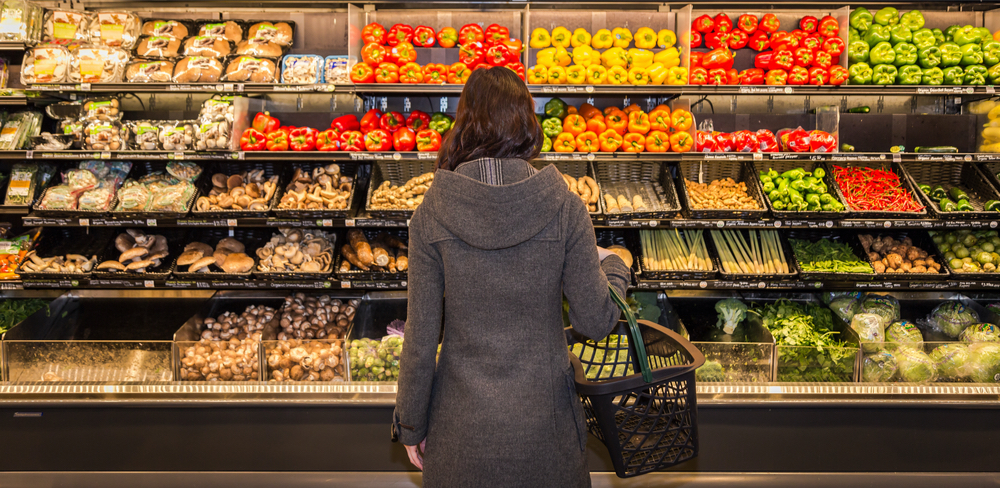A roundup of food policy topics
What’s Hot: Dollar General to Offer Produce in Up to 10,000 Store Locations
Dollar General is committing to carry fresh produce in up to 10,000 stores across the United States. The retailer is also donating $1 million to Feeding America and partnering with the hunger relief organization to provide more fresh food and meals to communities across the country. According to Supermarket News, a goal of this new partnership is to provide up to 20 million meals annually, nearly doubling the number of stores that Feeding America currently services.
The donation from Dollar General will allow Feeding America’s hunger initiatives, specifically in rural America, to provide more food to 95 percent of partnering food banks. Additionally, the introduction of produce in Dollar General stores will create greater access to fruits and vegetables for many Americans, especially since Dollar General is the largest retail chain in the United States, and about 75 percent of the United States’ population lives within five miles of a Dollar General store.
Food Policy Watchdog: California Bill Proposes Opening State-Funded Food Stamp Program to Undocumented Californians
Democrats in California have proposed opening California’s state-funded food stamp program to all income-eligible Californians, regardless of immigration status. The cost of the proposed expansion, which would start in 2023, was initially estimated to be about $550 million annually. After negotiations with the current state administration, the proposal was pared down this month to a two-year, $30-million project.
The bill under consideration has not yet been approved, but the effort to expand food access to undocumented people is unprecendented. Hesitations from conservatives suggest that food stamp expansion would highlight and complicate the United States-Mexico border conflict and would encourage people to immigrate to California.
Quote of the Month:
“The world has not been generally progressing either towards… ensuring access to safe, nutritious and sufficient food for all people all year round, or towards… eradicating all forms of malnutrition.” – The State of Food Security and Nutrition in the World 2021 Report, Food and Agriculture Organization (FAO) of the United Nations
There was an increase in world hunger in 2020, according to The State of Food Security and Nutrition in the World, a report published this month by the Food and Agriculture Organization (FAO) of the United Nations. Nearly ten percent of all people across the world are estimated to have been undernourished in 2020, up from 8.4 percent in 2019. More than half of all undernourished people live in Asia, more than a third in Africa, and a small percent in Latin America and the Caribbean.
In 2020, the report also found that more than 2.3 billion people, which is 30 percent of the global population, did not have access to food throughout the entire year. This measure of food insecurity increased in one year the same amount as it had in the past five years combined. Findings of the report note that much of this increase is related to COVID-19. The pandemic has triggered economic recessions, isolation leading to less access to food, in combination with pre-pandemic factors leading to food insecurity.
The report calls for an “enabling environment of governance mechanisms and institutions” to make changes possible. Most importantly, the report calls for immediate action, as hunger and undernutrition continue to occur with growing intensity, across the world.
Fact Check: How Have Wait-Staff Tips Changed Due to COVID-19?
While restaurants relied on take-out orders and minimal seated dining options during the height of the pandemic, restaurant servers were mainly dependent on generous customers tipping more than they did in pre-COVID times. The Counter, a nonprofit online news site that highlights for forces governing the way Americans eat, indicates that the COVID-19 pandemic forced a national conversation around “essential workers” who quite literally keep the economy, healthcare system, and food system afloat, although their pay does not reflect the important roles they play.
Restaurant employees have faced low wages, reliant on tipping and struggling to make ends meet. Rising rents and cost of living are underscored in a piece in The New York Times that notes that a lack of affordable housing is in part shaping the problem of an employment crisis across the country. Restaurateur LaToya Flood told the Times “It’s difficult to roll up your sleeves and work hard for minimum wage and feel like you’re suffocating because you can’t afford rent.”
The Atlantic reported that this conversation led to the “Great Pandemic Tipping Boom of 2020.” Restaurant workers across the country noted that the tips they were receiving were averaging 25 percent higher than in previous years. Now that many pandemic dining restrictions nationwide are being lifted, eating out has returned to 2019 levels, and estimations are that Americans may soon become less likely to tip big. Eater NY speculates that the decline in tips is likely due to the perception that service workers are no longer working risky jobs or require hazard pay.
University of Richmond marketing professor Sara Hanson says that as restaurants provide raises in order to encourage workers to rejoin the industry, customers are likely to tip less. However, dependence on tips as part of expected and necessary income for restaurant workers is nothing new and will not disappear as dining continues to return. While how much servers are compensated should not be up to diners, it is up to consumers to continue recognizing the importance of their tireless work.


